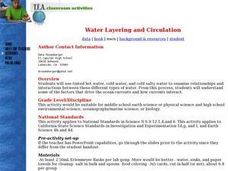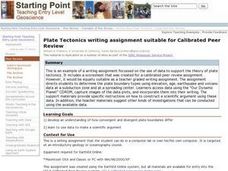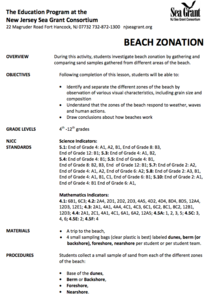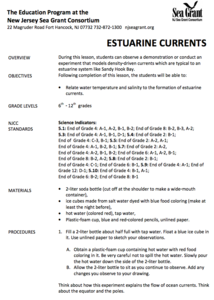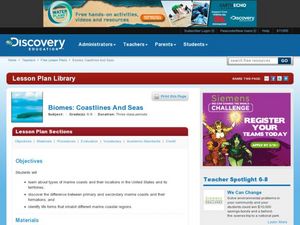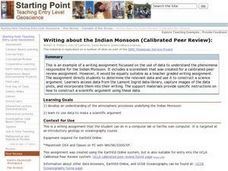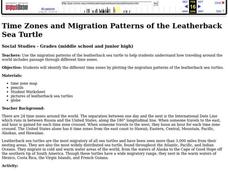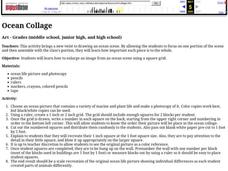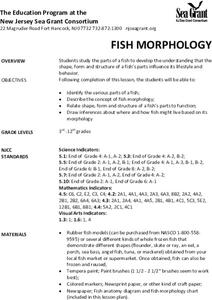Curated OER
Remote Sensing
Students study the effects of global warming on specific organisms. They research the possible problems global warming is causing.
Curated OER
Water Layering and Circulation
Students examine relationships and interactions between different types of water. They experiment with colored water of different temperature and salinity and discuss how the results relate to real ocean currents.
Michigan Sea Grant
Great Lakes, Great Careers
Pupils play a question-asking game to investigate careers relating to marine and aquatic science, then conduct research to further investigate the career of their choice—examples range from marine veterinarian to underwater...
Curated OER
Mapping the Ocean Floor
Students construct and interpret a line graph of ocean floor depth and a bar graph comparing the height/depth of several well-known natural and man-made objects and places. In addition, they calculate the depth of two points using sonar...
Curated OER
Plate Tectonics Writing Assignment
Students complete a writing assignment focused on the use of data to support the theory of plate tectonics. They access data using the "Our Dynamic Planet" CDROM, capture images of the data plots, and incorporate them into their writing. T
Curated OER
Beach Zonation
Young scholars investigate the characteristics of the beach environment and explore beach zonation. After gathering samples from different areas of the beach, students discuss how the beaches work and the characteristic of each zone....
Curated OER
Estuarine Currents
Students experiment observing a demonstration on models of density-driven currents which are typically found in an estuarine system of water flow. They compare/contrast water temperature and salinity to the formations of estuarine currents.
Curated OER
Ups and Downs of Diving
Students explore the science and sport of scuba diving. In this scuba diving lesson, students build Cartesian divers and observe their behavior under water pressure.
Curated OER
Biomes: Coastlines and Seas
Students study the different types of coastlines and their territories. For this marine coasts lesson students identify life forms that are in the coastal regions.
Curated OER
Writing About the Indian Monsoon (Calibrated Peer Review):
Students develop an understanding of the atmospheric processes underlying the Indian Monsoon. They explore the use data to make a scientific argument. They listen to lecture on atmospheric circulation processes.
Curated OER
What On Earth
Middle schoolers explore earth science through concept mapping, discussion, and self-discovery.
Curated OER
The Ocean Floor
Fifth graders discuss the process of sedimentation and the continental drift theory. They locate major structures on the ocean floor and they identify life forms at each level of the ocean.
Curated OER
Time Zones and Migration Patterns of the Leatherback Sea Turtle
Students identify the different time zones by plotting the migration patterns of the leatherback sea turtles. They discover that traveling around the worlds includes passage through different time zones.
Curated OER
Into the Sea
Students display an awareness of the diversity of species in the coral reef, their habitat and adaptations. They conduct research to find and then color code the locations of coral reefs around the world.
Curated OER
Heat Flow
Students explore how a whale's countercurrent flow of blood is an example of a heat exchange system and conduction. Excellent worksheet provided.
Curated OER
Ocean Collage
Students re-create an image from a marine life scene. They are given a single square of the entire picture to focus on. When all squares are completed, the picture is assembled.
Curated OER
PASSWORD VOCABULARY REVIEW
Students write definitions for vocabulary words used in a unit in any subject area. They use the words to play a game.
Curated OER
SUBMARINE MOUNTAINS
Students create a two-dimensional contour map of a submerged area from a simulated survey using sounding techniques.
Curated OER
Building A Topographic Model
Pupils visualize, in three dimensions, features represented by contour lines on a topographic map. They see that the different elevations shown on a two dimensional topographic map can be used to build a 3-D model.
Curated OER
Sea Connections
Students, after locating different marine habitats on a globe, play a card game about ecosystems, food webs and organisms.
Curated OER
Fish Morphology
Students identify the various parts of a fish. They describe the concept of fish morphology and relate shape, form and structure of a fish's parts to function.
Curated OER
GPS Art
Students design their own logo or picture and use a handheld GPS receiver to map it out. They write out a word or graphic on a field or playground, walk the path, and log GPS data. The results display their "art" on their GPS receiver...
Curated OER
Water in the Texas Coastal Basins
Students, after researching a Texas coastal basin, map and graph the information they collect and then translate it into a short report to be presented to their classmates. They brainstorm unique ways to maintain Texas estuaries as well...
Curated OER
What is Biocomplexity?
Students dicuss different aspects of biocomplexity. They demonstrate synthesis of complex concepts by creating before and after posters expressing how the concepts of biocomplexity have ben internalized. Students define the term...
Other popular searches
- Oceanography Science
- Oceanography Activities
- Oceanography Vocabulary
- Oceanography Tides
- Introduction to Oceanography
- Oceanography Exploration
- Oceanography Lab
- History of Oceanography
- Careers in Oceanography
- Oceanography Shells
- Geological Oceanography
- Oceanography Careers



